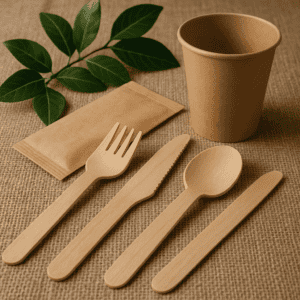The global movement towards sustainability has permeated nearly every aspect of our lives, from the food we eat to the products we use daily. One notable shift in this eco-conscious journey is the increasing use of wooden cutlery as an environmentally-friendly alternative to plastic utensils. As consumers and businesses become more environmentally aware, the appeal of cutlery wood options grows as a method for reducing our ecological footprint.
Understanding the Impact of Plastic Cutlery
Before delving into the benefits of wooden utensils, it is crucial to grasp the environmental repercussions of plastic cutlery. Plastic is a major contributor to pollution, particularly in our oceans, as it does not biodegrade and can remain in the environment for hundreds of years. This longevity threatens marine life and disrupts ecosystems, leading to a pressing need for sustainable alternatives.
The Emergence of Wooden Cutlery
As a response to the negative impacts of plastic, wooden cutlery has emerged as a practical solution. Made from natural resources, such as birch or bamboo, wooden cutlery is biodegradable and compostable. This means that, under the right conditions, it can break down and return nutrients to the earth, unlike plastic, which fragments into microplastics that persist in the environment.
Advantages of Choosing Wooden Cutlery
Switching to cutlery made from wood provides numerous benefits. For one, it significantly lowers the amount of waste that ends up in landfills. Moreover, wooden utensils are generally sourced from renewable materials, which can be replenished over time, ensuring a more sustainable life cycle. Businesses that adopt wooden cutlery also convey a message of environmental responsibility, which can positively influence their brand image among eco-conscious consumers.
Complementing Wooden Utensils with Sustainable Packaging
For a truly green approach, pairing wooden cutlery with sustainable packaging is fundamental. Companies like Biopak containers are leading the way in eco-friendly food packaging solutions. These containers, often made from plant-based materials, are both compostable and biodegradable, aligning with the sustainable ethos that accompanies wooden utensils.
Challenges and Considerations
Despite the obvious advantages, there are challenges to the widespread adoption of wooden cutlery. Accessibility and cost can be barriers for some consumers and small businesses. Additionally, there are considerations regarding the source of the wood, as it should ideally come from responsibly managed forests to prevent deforestation and habitat destruction.
The Role of Suppliers in Promoting Sustainability
Suppliers play a critical role in promoting and facilitating the shift to greener products. WF Plastic, for example, offers a wide range of sustainable products, including wooden cutlery and biodegradable containers. By providing accessible eco-friendly options, suppliers like WF Plastic enable businesses to make environmentally responsible choices without compromising on quality or convenience.
Consumer Influence and Market Demand
Consumer demand often drives market trends, and the demand for sustainable products is no exception. As individuals become more informed about the environmental impact of their choices, they exert influence on businesses to supply greener options. This consumer power can accelerate the adoption of wooden cutlery and similar sustainable products across the foodservice industry.
Education and Awareness
Educating the public about the environmental benefits of wooden cutlery, as well as the issues surrounding plastic waste, is crucial. Awareness campaigns and information sharing can empower consumers to make informed decisions and encourage businesses to reevaluate their practices in favour of more sustainable models.
The Future of Wooden Cutlery
The future of wooden cutlery looks promising as society continues to seek alternatives to single-use plastics. As technology advances, we may see even more innovative and environmentally friendly options arise. In the meantime, wooden cutlery stands as a beacon for change, illustrating how small shifts in our habits can have a significant impact on the health of our planet.
Embracing a Greener Lifestyle
Embracing wooden cutlery is a simple yet effective way for individuals and businesses to contribute to a greener future. This shift not only reduces plastic waste but also promotes a circular economy where resources are used more wisely and efficiently.
Conclusion
As we collectively move towards sustainable living, it is clear that choices like opting for wooden cutlery can make a substantial difference in our environmental impact. With the support of suppliers who offer eco-friendly alternatives and the increased demand from environmentally conscious consumers, the journey toward a more sustainable future is well underway. Wooden cutlery is not merely a trend; it is a symbol of our dedication to preserving the earth for future generations.
Joining Forces for Environmental Change
In conclusion, the transition to sustainable utensils such as wooden cutlery is a positive step in the ongoing battle against plastic pollution. By choosing eco-friendly alternatives, supporting green suppliers, and fostering a culture of sustainability, we can all contribute to a healthier, greener future.

